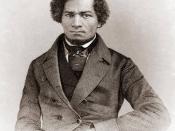Self-Deception
Goethe made a character that came in contact with several people who deceived themselves for one reason or another. Frederick Douglass came in contact with more people who made false reasons for them to believe in something. It's not rare in society that someone makes him or herself think one thing for their own satisfaction but is actually the opposite. When a person does deceive himself, society does nothing to prevent it. In fact, in most cases, societies spur the actions on, further giving the individual more of a reason to continue or increase the extent of their deeds. Also, the many similarities and differences for motivation of self-deception will be examined.
In The Sorrows of Young Werther, several people deceived themselves, but all in the name of love. The entire work revolved around a young man, Werther, who writes letters to his friend about mostly a young woman named Charlotte. As a man who lives by the lower class standards, he finds it hard to find love. When invited to the district judge's party, his aunt warned him of the judge's daughter, Charlotte. Not even showing a bit of interest, Werther finally laid eyes on her and "saw before [him] the most charming spectacle [he] had ever witnessed" (18). As the two budding couples get to know each other more and more, they fall deeper and deeper in love. But, there is a problem amidst. Charlotte is engaged to another man, Albert. While the two new lovers spend tons of time together, the problem of Charlotte's fiancée remains. He is not a mean man; in fact Werther comments, "certainly Albert is the best fellow in the world" (45). Werther leaves to try to discontinue his love for Charlotte but he is only fooling himself.


